Should the United States accept refugees?
Since its earliest days as part of the United States, Iowa has a long history of being a destination for those from other countries to find a new home. Such newcomers are called immigrants. A special class of those are people fleeing wars, persecution or other dangers from their former homes. These immigrants are termed "refugees." Like the larger class of immigrants, Iowa has confronted both the challenges and opportunities of accepting new arrivals as permanent residents.
Early Refugees in the United States
In the 19th century, there were few restrictions on traveling to America. While most Mormons were not from foreign countries, thousands of Latter Day Saints made their way across southern Iowa when they were forced out of their homes in Nauvoo, Illinois, following the assassination of their leader Joseph Smith. Most did not stay but continued their trek across the Great Plains to Utah. During the same years, many German families were arriving in the Mississippi River towns of Davenport, Clinton and Dubuque. Conservative governments in the German states were threatening those who had participated in revolutions or who advocated for greater democracy. In response, many migrated to the Midwest and created strong pockets of German culture. Irish families facing starvation when the potato beetle destroyed the staple of the Irish diet arrived in Iowa to start new lives. Religious and political persecution in the Netherlands and Hungary also led to refugee flights to Iowa.
Poverty and persecution continued to propel European populations to seek new homes. Until the end of the 19th century, most immigrants to Iowa had come from northern European countries, especially Germany, Ireland, Scandinavia and the British Isles. However, in the 1890s and for some 30 years after, southern and eastern Europe immigration rapidly increased. Because free or cheap lands had already been settled, most of these arrivals headed for the cities in the eastern states. While they might not have been under immediate threats, poverty and the lack of opportunity had motivated them to seek new homes. In Iowa, Czechs, Italians, Croats, Welsh, British and Swedes entered the coal mines.
Post-WWI Displaced Persons
A new term emerged in the American vocabulary following World War I: "Displaced Persons." The DPS, as they were called, had been in the path of invading armies, sometimes facing starvation when crops or other livelihoods were destroyed. Americans welcomed some, but there were those who feared that the numbers of newcomers were changing the face of the nation. In 1923, a Federal Immigration Act put strict quotas on the numbers of immigrants from southern and eastern European countries and barred Asian and other non-white races from entering the country.
In the 1960s, civil wars and other disruptions forced many to flee their homes. In the early 1970s, Iowa Governor Robert Ray took a courageous stand to begin a resettlement program for Vietnamese and Laotian families who had been caught up in those nations' conflicts. He encouraged churches and other social agencies to sponsor refugee families and help them learn the language and culture and get jobs. Bosnian refugees to Iowa later received local assistance when they needed to get away from genocides in their homelands as did refugees from several African countries.
Present-Day Immigration Debate
In most of the cases above, the refugees arrived through legal channels established by Congress. The immigrant problem of today centers around those who cross America's borders illegally and sometimes live here for years without proper identification. Many have fled poverty or violence, especially from Mexico and Central America, and have applied as refugees. A particular problem concerns those whose parents brought them here as children and the United States is the only country they have ever known. Should they be allowed to remain or does that encourage others to challenge immigration restrictions? As long as the United States becomes a target for those seeking a better life, the nation will have to establish laws for who can live here, whether as immigrants or refugees.
Supporting Questions
How has America helped refugees in the past?
- Sewing Class for Refugee Students in Mt. Ayr, Iowa, 1918 (Image)
- Junior Red Cross Members in Des Moines, Iowa, Packing Sweaters for War Refugees, between 1942 and 1943 (Image)
- "900,000 Plus, Arab Refugees" Newspaper Article, December 7, 1957 (Document)
- "Refugees - Indochina Status Report" by President Gerald Ford, April 3, 1975 (Document)
- Memo from Daniel Parker to Theodore Marrs about Airlift of Vietnamese Children, April 3, 1975 (Document)
- Vietnamese Babies in Carriers on an Airplane to America, April 5, 1975 (Image)
- Iowa Governor Robert Ray's Congressional Hearing Testimony about Refugee Legislation, May 24, 1979 (Document)
- Resolution of the Republican Governors Association Regarding Cambodia, November 20, 1979 (Document)
- Cambodia Crisis Campaign Magazine Advertisement, Date Unknown (Document)
What has been Americans' attitude towards refugees?
- "Local Citizens Will Sponsor Vacations for Refugees," Newspaper Article, July 3, 1940 (Document)
- "Greenbelt Greets Refugee Visitors" Newspaper Article, July 25, 1940 (Document)
- "Refugees Days Full While in Greenbelt" Newspaper Article, August 1, 1940 (Document)
- Memo from E.L. Colton to Iowa Governor Robert Ray about Cuban Refugees, May 7, 1980 (Document)
- Letter from Mrs. Stuhr to Iowa Governor Robert Ray about Tai Dam Refugees, May 13, 1980 (Document)
- Letter from Mrs. Knode to Iowa Governor Robert Ray about Tai Dam Refugees, May 22, 1980 (Document)
What are the possible risks associated with helping refugees?
- President Gerald Ford's Condolence Letter to Sgt. Kenneth Nance's Parents, May 2, 1975 (Document)
- H.R.5816 - To Suspend, and Subsequently Terminate, the Admission of Certain Refugees, July 14, 2016 (Document)
- President Donald Trump's Executive Order about Foreign Terrorist Entry into the United States, March 6, 2017 (Document)
- International Committee of the Red Cross Memo for Foreign Workers near Thai-Cambodian Border, Date Unknown (Document)
| Refugees in America Source Set Teaching Guide |
| Printable Image and Document Guide |
Sewing Class for Refugee Students in Mt. Ayr, Iowa, 1918
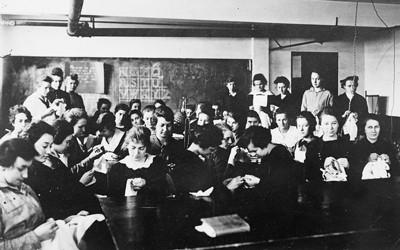
Description
This photograph was taken in Mt. Ayr, located in southeast Iowa, in 1918. The image shows refugees from Europe taking part in a sewing class.
Junior Red Cross Members in Des Moines, Iowa, Packing Sweaters for War Refugees, between 1942 and 1943
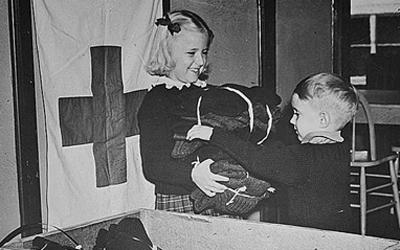
Description
This photograph shows two young junior members of the American Red Cross in Des Moines, Iowa. The two children are packing clothing for refugees during World War II.
"900,000 Plus, Arab Refugees" Newspaper Article, December 7, 1957
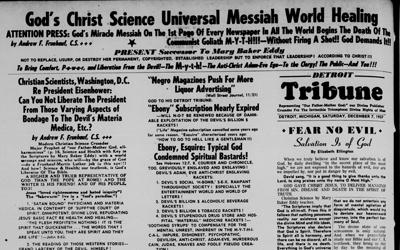
Description
This small featured piece in The Detroit Tribune is calling on the "Hebrews" to help aid the 900,000+ Arab refugees. The article is asking for $100.00 in aid from sympathetic readers.
"Refugees - Indochina Status Report" from President Gerald Ford, April 3, 1975
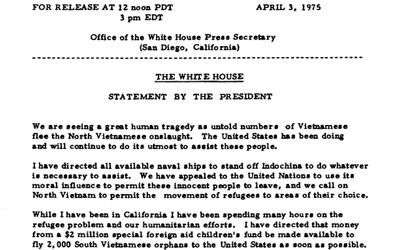
Description
This document is President Gerald Ford's statement to the press. In it he says, "We are seeing a great human tragedy as untold numbers of Vietnamese flee the North Vietnamese onslaught. The United States has been doing and will continue to do its utmost to assist…
Memo from Daniel Parker to Theodore Marrs about Airlift of Vietnamese Children, April 3, 1975
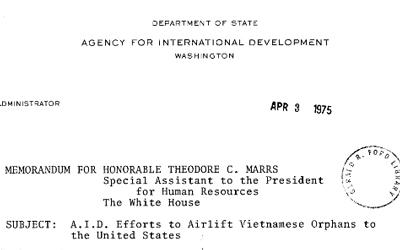
Description
This memo is from Daniel Parker to Theodore Marrs, the special assistant to the U.S. president for human resources. Parker, who works in the State Department's Agency for International Development, recommended the release of funds to begin airlifting 2,000…
Vietnamese Babies in Carriers on an Airplane to America, April 5, 1975

Description
This photograph shows Vietnamese babies and small children aboard an airplane bound for the United States as part of Operation Babylift, which was the name given to the mass evacuation of children from South Vietnam to the U.S. and other countries at the end of the…
Iowa Governor Robert Ray's Congressional Hearing Testimony about Refugee Legislation, May 24, 1979
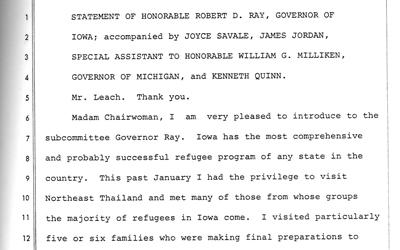
Description
The source is a transcription of Iowa Governor Robert Ray's speech in front of the U.S. House of Representatives' subcommittee on Immigration, Refugees and International Law in 1979. Ray spoke on his feelings of moral obligation for resettling Tai Dam refugees in Iowa…
Resolution of the Republican Governors Association Regarding Cambodia, November 20, 1979
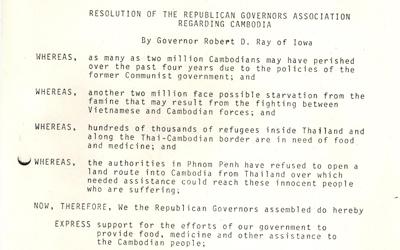
Description
This document is of the resolution passed by the Republican Governors Association regarding a rising humanitarian crisis in Cambodia in 1979. In the resolution, the Republican Governors Association states that they support the efforts of the U.S. government to provide…
Cambodia Crisis Campaign Magazine Advertisement, Date Unknown
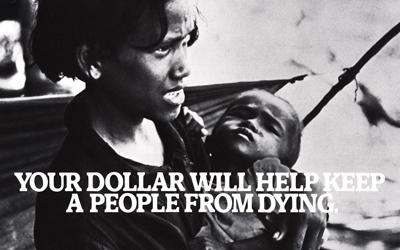
Description
This magazine advertisement was created by The National Cambodia Crisis Committee and states that "Your Dollar Will Help Keep A People From Dying." In the crisis campaign ad, the committee is asking for funding to help starving Cambodians they say are trapped in Thai…
"Local Citizens Will Sponsor Vacations for Refugees," Newspaper Article, July 3, 1940
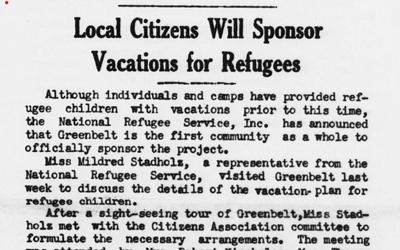
Description
This article from the Greenbelt Cooperator, a newspaper in Greenbelt, Maryland, highlighted a new program from the National Refugee Service that will start in Greenbelt with the arrival of 15 refugee children for two weeks from late July to early…
"Greenbelt Greets Refugee Visitors" Newspaper Article, July 25, 1940

Description
This article from the Greenbelt Cooperator, a newspaper in Greenbelt, Maryland, and features 15 refugee children who came to the town. The children were between eight and 12 years old and they came Prussia, Vienna, Nuremberg,…
"Refugees Days Full While in Greenbelt" Newspaper Article, August 1, 1940
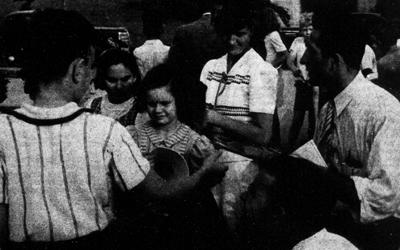
Description
This article was published in the Greenbelt Cooperator, a newspaper in Greenbelt, Maryland. Fifteen refugee children from Europe were visiting Greenbelt for the summer, and the article covered some of the many activities the children were involved in while…
Memo from E.L. Colton to Iowa Governor Robert Ray about Cuban Refugees, May 7, 1980
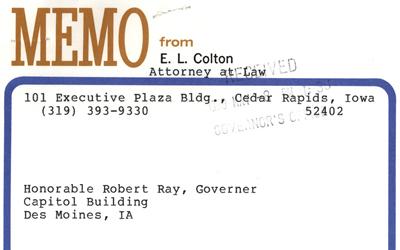
Description
This document is a memo from attorney E.L. Colton to Iowa Governor Robert Ray. In the memo, Colton said that he gave money to Vietnam refugees and that he would like to do the same for Cuban refugees who were being persecuted under Fidel Castro's regime.
Letter from Mrs. Stuhr to Iowa Governor Robert Ray about Tai Dam Refugees, May 13, 1980
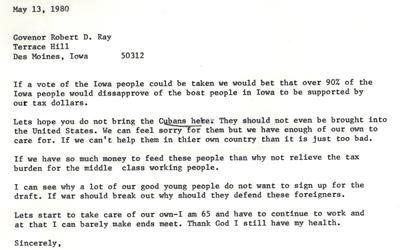
Description
This letter is from Iowan Mrs. John Stuhr to Iowa Governor Robert Ray in 1980. Stuhr is from Council Bluffs, and she is writing the governor to express her disapproval of the state's support of southeast Asian refugee resettlement in Iowa.
Letter from Mrs. Knode to Iowa Governor Robert Ray about Tai Dam Refugees, May 22, 1980

Description
This letter was written by Iowan Mrs. Ronald Knode to Iowa Governor Robert Ray in 1980. In the letter, Knode disapproved of the state's resettlement of Tai Dam refugees.
President Gerald Ford's Condolence Letter to Sgt. Kenneth Nance's Parents, May 2, 1975

Description
This condolence letter from President Gerald Ford was written to the parents of Army Sgt. Kenneth E. Nance, who was killed in a plane crash while attempting to evacuate refugees from Vietnam.
H.R. 5816 - To Suspend, and Subsequently Terminate, the Admission of Certain Refugees, July 14, 2016
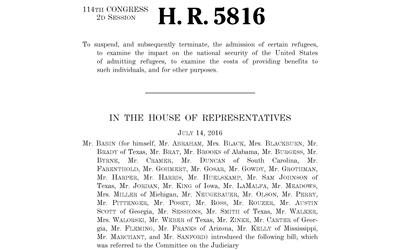
Description
This U.S. House resolution, which was passed July 14, 2016, called for the suspension, and subsequent termination of the admission of certain refugees in to the United States. The resolution, also titled, "Resettlement Accountability National Security…
President Donald Trump's Executive Order about Foreign Terrorist Entry into the United States, March 6, 2017
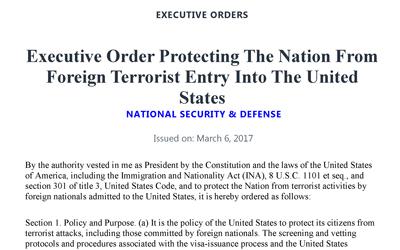
Description
This controversial Executive Order 13780 from President Donald Trump, also titled, "Protecting The Nation From Foreign Terrorist Entry Into The United States" and known as the "travel ban," placed limits on travel to the U.S. from certain countries, and by all refugees…
International Committee of the Red Cross Memo for Foreign Workers near Thai-Cambodian Border, Date Unknown
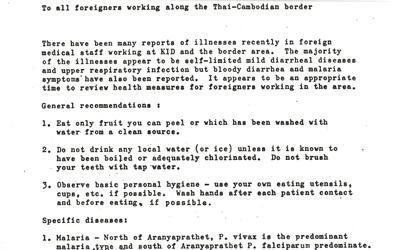
Description
This memo from the International Committee of the Red Cross was directed at foreign workers near the Thai-Cambodian border. The document advised them of a number of diseases on the rise near that location, such as malaria, hepatitis, polio, cholera and tuberculosis.…
Additional Resources
- Women's Refugee Commission
This website is for the Women's Refugee Commission, an organization that works to improve the lives and protect the rights of women, children and youth displaced by conflict and crisis. This nonprofit is a leading expert on the needs of refugee women and children. - "I Am Syria" Campaign
This nonprofit media campaign website seeks to educate the world of the Syrian Conflict. This website includes video, pictures and articles to inform the public about the atrocities and human rights abuses occurring in the present-day Syria. - "Internally Displaced People" ICRC Website
This online resource focuses on the work to help "internally displaced people" through the International Committee of the Red Cross.
Iowa Core Social Studies Standards (7th Grade)
Listed below are the Iowa Core Social Studies content anchor standards that are best reflected in this source set. The content standards applied to this set are high school-age level and encompass the key disciplines that make up social studies for seventh-grade students.
| No. | Standard Description |
| SS.7.13. | Identify social, political and economic factors that can influence our thoughts and behavior. |
| SS.7.15. | Distinguish and apply the powers and responsibilities of global citizens, interest groups and the media in a variety of governmental and nongovernmental contexts. (21st century skills) |
| SS.7.21. | Evaluate the push and pull factors involved in human population movement and patterns. |
| SS.7.24. | Analyze connections among historical events and developments in contemporary global issues. |
| SS.7.25. | Explain how and why perspectives on various contemporary issues have changed over time. |
| SS.7.26. | Explain multiple causes and effects of various contemporary global events and developments. |
| SS.7.27. | Analyze the role that Iowa plays in contemporary global issues. |